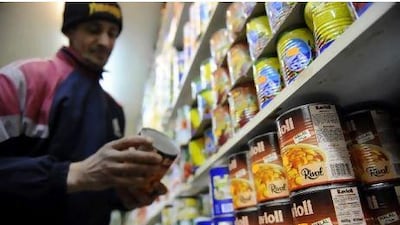LONDON // Muslim and Jewish groups are preparing to challenge animal-rights campaigners next year over a European Union measure that would require halal and kosher meat products to carry a label saying the animals were not stunned before slaughter.
Animal-welfare legislation in Europe requires that abattoirs stun all animals prior to slaughter unless they are being ritually killed according to the practices of a non-Christian religion.
The move to require halal and kosher meat producers to provide consumers with more information on the packaging of their products has enraged Jewish and Muslim organisations, with the latter claiming that the move has little to do with animal welfare but, rather, reflects a pan-European bias against Islam.
Earlier this year, members of the European Parliament, by a vote of 559 to 54, passed Amendment 205 to the food-information regulation, which would require all meat from ritually slaughtered animals to be labelled: "Derived from animals that have not been stunned prior to slaughter."
A committee of the EU Council of Ministers vetoed the measure earlier this month, but members of the European Parliament are now determined to resurrect it in the coming months. "This is an emotive subject but, looked at in the cold light of day, it was clearly a discriminatory proposal," said Abdalhamid Evans, the director of the World Halal Forum Europe Project. "If consumer interest is the issue, then surely all meat products should disclose the method of slaughter, and even say which stunning methods have been used prior to slaughter."
He said there was "no clear scientific evidence" that stunning is more humane. On the contrary, "religious slaughter, performed well on a calm animal, is likely to be the least painful for the animals", said Mr Evans, citing studies by Temple Grandin, a professor of animal science at Colorado State University widely known for her efforts to improve standards in slaughter plants and livestock farms.
Yunus Dudhwala, the chairman of the Halal Monitoring Committee in Britain, said he believed that animal welfare was a "red herring" because there was little interest shown in factory farming methods and the conditions of animal transportation prior to slaughter.
He told The Guardian newspaper this week that he would be happy for un-stunned meat to be labelled if other meat carried the method of stunning used, such as gassing or electrocution. He indicated, however, that this would never happen because it would be unpalatable for consumers.
Officials for Jewish organisations praised the EU committee's veto earlier this month of the proposed labelling measure but warned that the idea was not dead.
"There is still much work to do to ensure that new laws are not introduced next year which discriminate against shechita," said Simon Cohen, referring to the Jewish method of ritual slaughter.
"The European Commission is beginning a new consultation next year on animal welfare labelling, and we are continuing to work in Brussels with the European Jewish Congress to explain to the European food authorities the humane nature of shechita slaughter," said Mr Cohen, the director of Schechita UK.
"Our campaign is far from over, but we are making satisfactory progress, given the assault on shechita that was launched earlier this year by some members of the European Parliament."
Compassion in World Farming (CWF), which campaigned in favour of the labelling, said a report from the UK government's Farm Animal Welfare Council found that cutting an animal's throat without stunning induced "significant pain and distress".
Phil Brooke, the welfare development manager at CWF, said: "We don't have a problem with religious slaughter - we have a problem with any kind of slaughter that is inhumane.
"While it's allowed, we think that any products that come from an un-stunned animal should be labelled as such."
Britain's National Secular Society has also been pressing the government to back Amendment 205 - which it did not do at the Council of Ministers' meeting - on the grounds that religious slaughter exemptions should only be allowed for quantities of animals necessary to meet the demands of that religion.
At present, it is believed that millions of animals, chickens in particular, are slaughtered according to kosher and halal standards and then sold to unwitting, non-Muslim customers, providing a large and profitable market to producers.
"Keeping the public in ignorance so they carry on subsidising a slaughter method which they do not approve of is simply indefensible," said Stephen Evans, the society's campaigns officer. "While we're naturally disappointed that this amendment has fallen, this is far from the end of the campaign to ensure meat from religiously slaughtered animals is labelled.
"We are anticipating European Commission proposals on welfare labelling in 2011 and we will be ensuring that the government is well aware of our views - which we believe are supported by the overwhelming majority of the British public."

